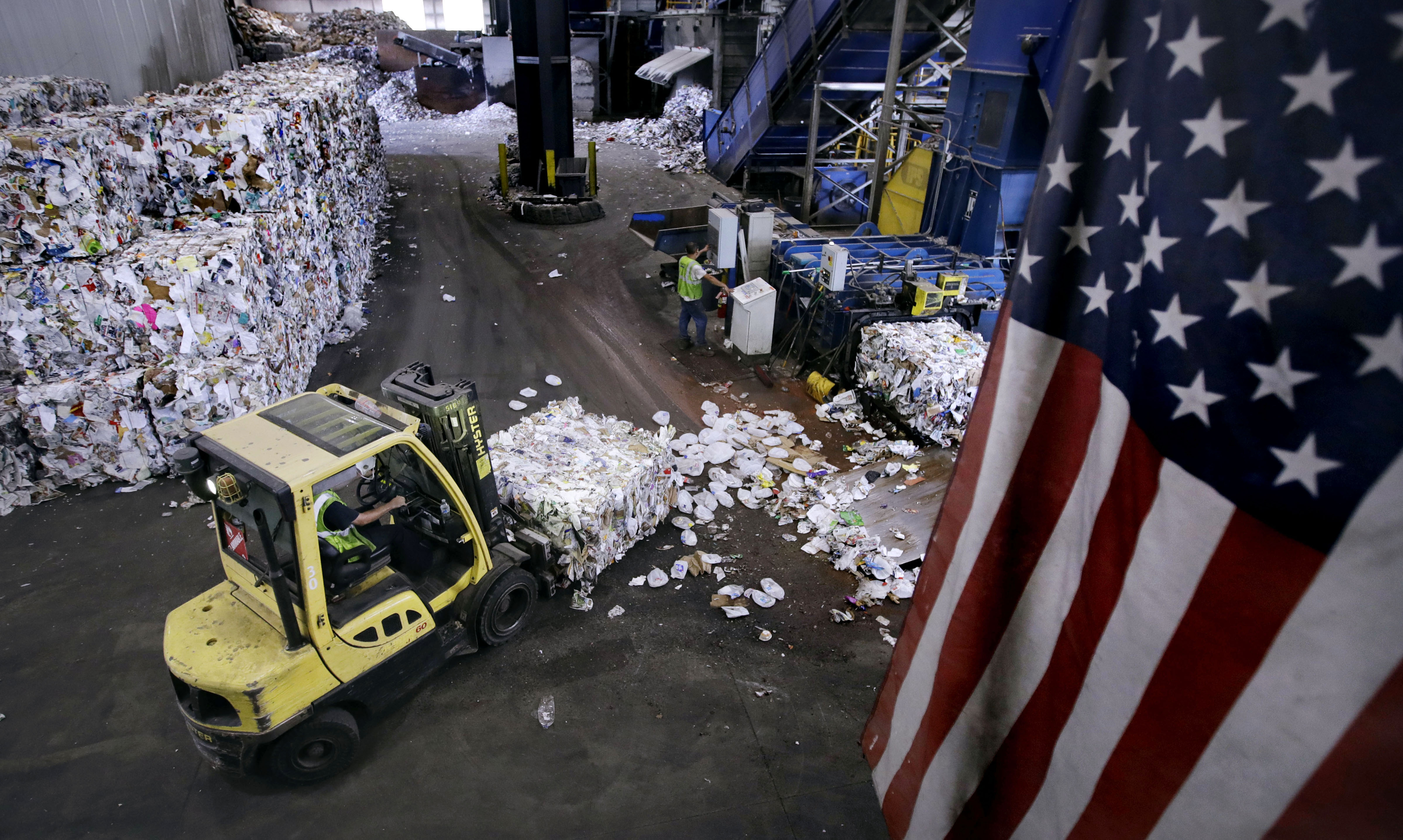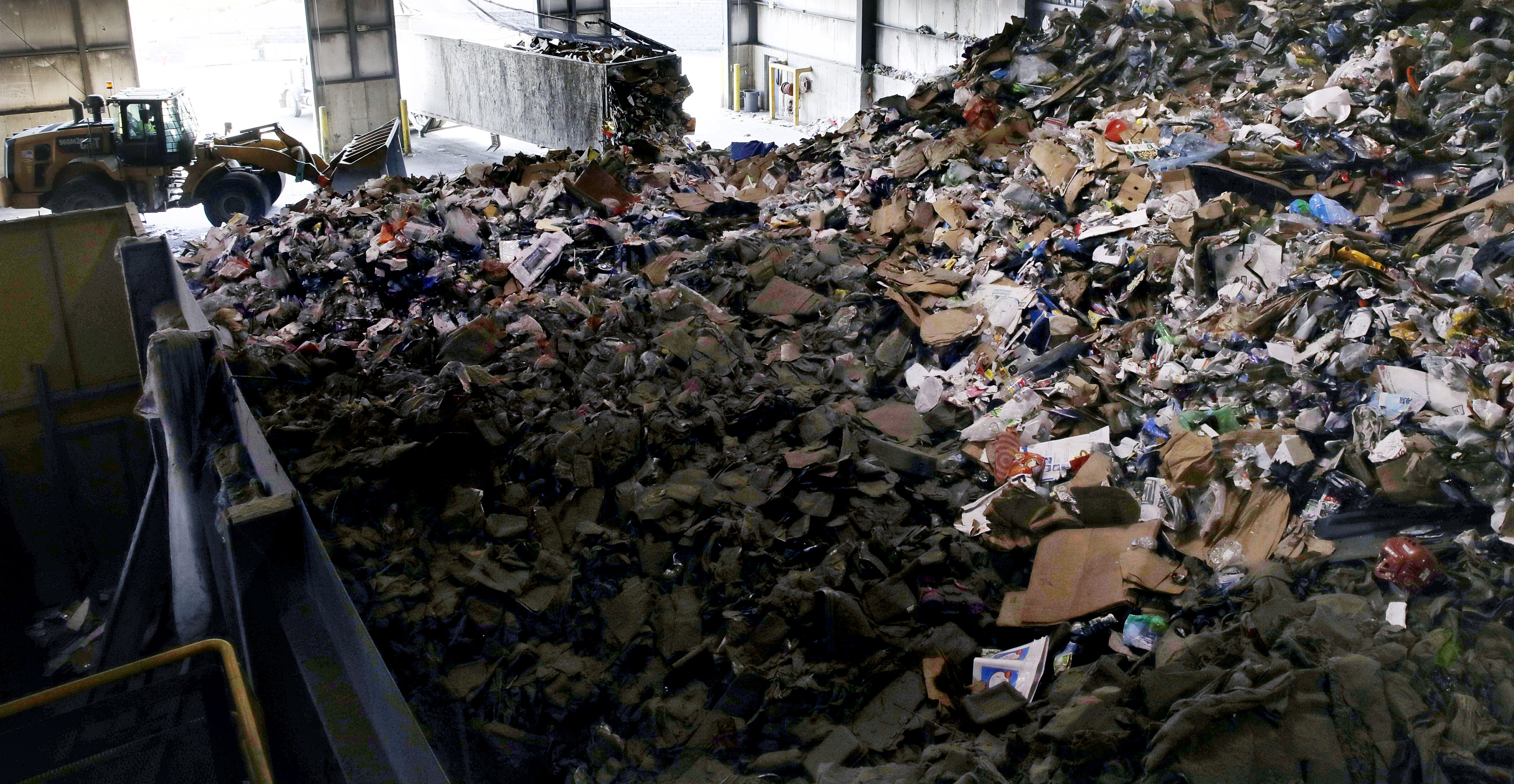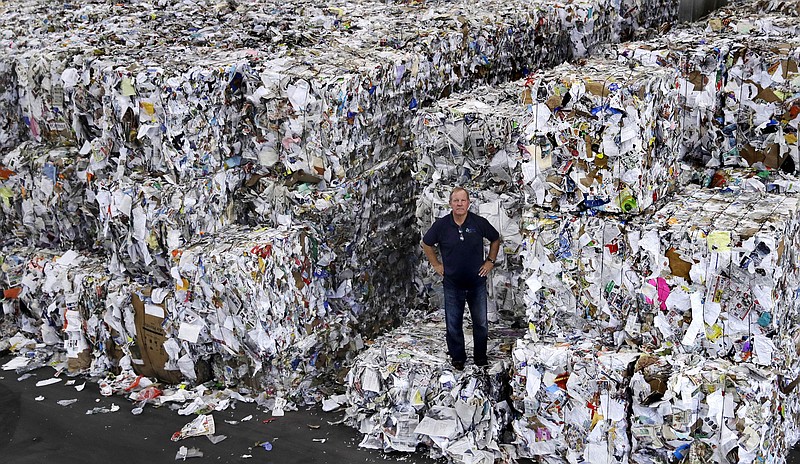America's recycling industry is in the dumps.
A crash in the global market for recyclables is forcing communities to make hard choices about whether they can afford to keep recycling or should simply send all those bottles, cans and plastic containers to the landfill.
Mountains of paper have piled up at sorting centers, worthless. Cities and towns that once made money on recyclables are instead paying high fees to processing plants to take them. Some financially strapped recycling processors have shut down entirely, leaving municipalities with no choice but to dump or incinerate their recyclables.
 In this Thursday, Sept. 6, 2018, photo, a forklift takes a bundle of residential mixed fiber, comprised of a variety of paper and cardboard, off a conveyor belt at the end of a separating machine at EL Harvey & Sons, a waste and recycling company, in Westborough, Mass. Recycling programs across the United States are shutting down or scaling back because of a global market crisis blamed on contamination at the curbside bin. (AP Photo/Charles Krupa)
In this Thursday, Sept. 6, 2018, photo, a forklift takes a bundle of residential mixed fiber, comprised of a variety of paper and cardboard, off a conveyor belt at the end of a separating machine at EL Harvey & Sons, a waste and recycling company, in Westborough, Mass. Recycling programs across the United States are shutting down or scaling back because of a global market crisis blamed on contamination at the curbside bin. (AP Photo/Charles Krupa)"There's no market. We're paying to get rid of it," says Ben Harvey, president of EL Harvey & Sons, which handles recyclables from about 30 communities at its sorting facility in Westborough, Massachusetts. "Seventy-five percent of what goes through our plant is worth nothing to negative numbers now."
It all stems from a policy shift by China, long the world's leading recyclables buyer. At the beginning of the year it enacted an anti-pollution program that closed its doors to loads of waste paper, metals or plastic unless they're 99.5 percent pure. That's an unattainable standard at U.S. single-stream recycling processing plants designed to churn out bales of paper or plastic that are, at best, 97 percent free of contaminants such as foam cups and food waste.
The resulting glut of recyclables has caused prices to plummet from levels already depressed by other economic forces, including lower prices for oil, a key ingredient in plastics.
The three largest publicly traded residential waste-hauling and recycling companies in North America - Waste Management, Republic Services and Waste Connections - reported steep drops in recycling revenues in their second-quarter financial results. Houston-based Waste Management reported its average price for recyclables was down 43 percent from the previous year.
"A year ago, a bale of mixed paper was worth about $100 per ton; today we have to pay about $15 to get rid of it," says Richard Coupland, vice president for municipal sales at Phoenix-based Republic, which handles 75 million tons of municipal solid waste and 8 million tons of recyclables nationwide annually. "Smaller recycling companies aren't able to stay in business and are shutting down."
A big part of the problem, besides lower commodity prices overall, is sloppy recycling.
 In this Thursday, Sept. 6, 2018, photo, a front-end loader waits as a truck filled with unsorted recyclable refuse is offloaded and its contents added to a giant pile in a processing building at EL Harvey & Sons, a waste and recycling company, in Westborough, Mass. Recycling programs across the United States are shutting down or scaling back because of a global market crisis blamed on contamination at the curbside bin. (AP Photo/Charles Krupa)
In this Thursday, Sept. 6, 2018, photo, a front-end loader waits as a truck filled with unsorted recyclable refuse is offloaded and its contents added to a giant pile in a processing building at EL Harvey & Sons, a waste and recycling company, in Westborough, Mass. Recycling programs across the United States are shutting down or scaling back because of a global market crisis blamed on contamination at the curbside bin. (AP Photo/Charles Krupa)In the early days of recycling, people had to wash bottles and cans, and sort paper, plastic, glass and metal into separate bins. Now there's single-stream recycling, which allows all recyclables to be tossed into one bin. While single-stream has benefited efficiency, and customers like it, it's been a challenge on the contamination side.
"The death of recycling was completely avoidable and incredibly easily fixed," says Mitch Hedlund, executive director of Recycle Across America, which advocates standardized labeling on recycling bins so people understand what goes in and what doesn't.
